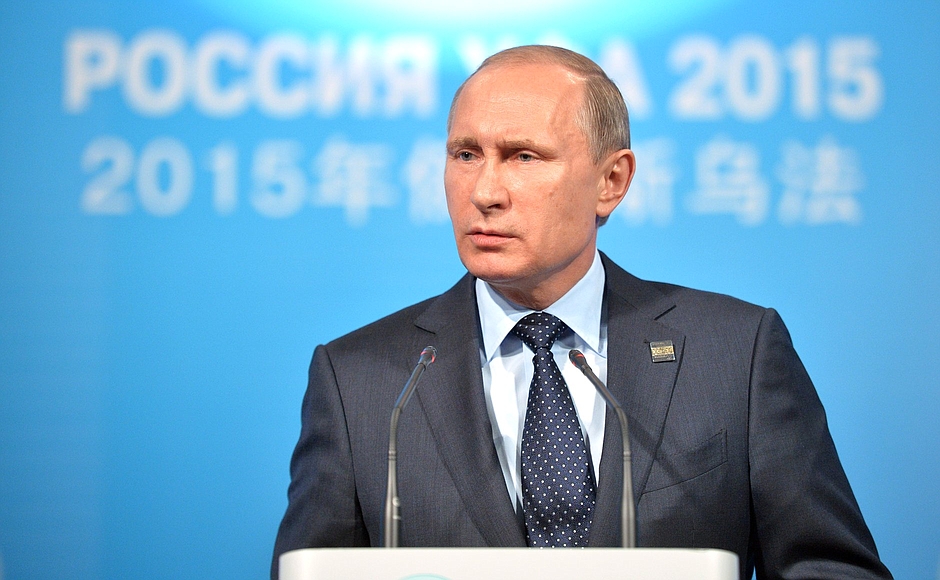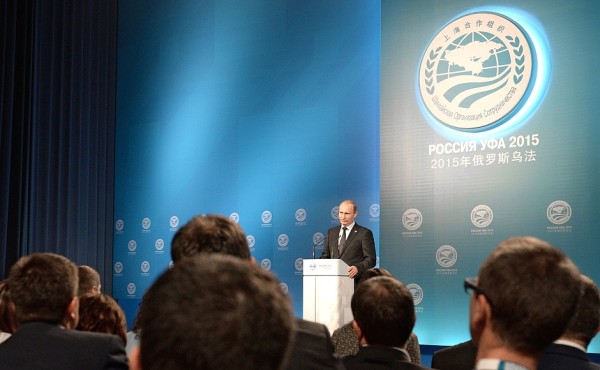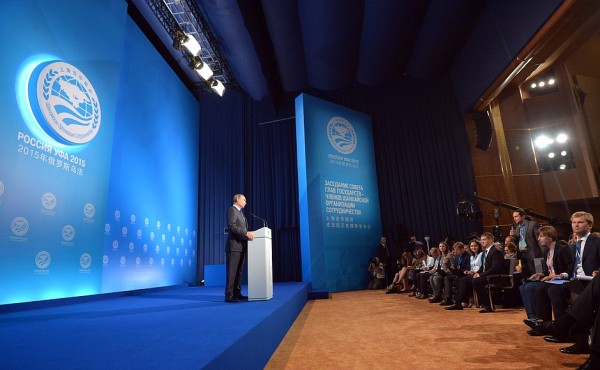News conference of Putin after SCO summits: Terrorism is comes from Afghanistan
Monitoring Desk: Russian President Vladimir Putin has said that terrorism is coming from Afghan land to its neighboring countries and Islamic State is present in Afghanistan.
He has said that Shanghai Cooperation Organisation (SCO) has decided to immediately work out anti-terrorism plan on Afghan borders.

He also said that he was hopeful that the SCO would become an additional venue for finding compromises and solutions on disputed issues between Pakistan and India.
Addressing a press conference after the concluding session of SCO summit in Ufa on Friday, Putin said that SCO had decided to start the process of approving full membership for India and Pakistan and everybody knew background of relations between these two countries and SCO leadership was hopeful that SCO would be an additional platform and venue to both neighbors for finding compromises and solutions on disputed issues.
Following is important points of his press conference:
Russian President Vladimir Putin said:
First of all, for the first time in the 15 years of the SCO, the decision was made to increase the number of members. We signed documents to begin the accession of India and Pakistan. Therefore, the SCO’s capabilities to react to modern threats and challenges will grow. The organisation’s political and economic potential will significantly expand.
A resolution was made to upgrade the status of Belarus to an observer. Armenia, Azerbaijan, Cambodia and Nepal have become dialogue partners. Several more states have expressed willingness to join as observers and dialogue partners. The geography is rather impressive – from South and Southeast Asia to the Middle East.
Summit passed the SCO Development Strategy that outlines the priority areas until 2025. They include priorities in all major areas of cooperation – from creating conditions to boost collaboration in trade and the economy to ensuring regional stability and prompt responses to conflicts and crises.
Ufa Declaration was adopted. The declaration describes general approaches to the most relevant international and regional problems and gives an assessment of the organisation’s day-to-day activity.
SCO had an in-depth discussion of the situation in Afghanistan. It was noted that ISIS had stepped up its activities and spread its tentacles to that country, which elevates the security threats on the southern borders of the Shanghai Cooperation Organisation.
It is no secret that drug money is a major source of funding for radical terrorist groups; therefore, the SCO members have outlined plans to counter the drug threat. These plans are incorporated in a special Statement of the summit. The newly adopted Border Cooperation Agreement is designed to curb drug trafficking as well.
The SCO presidency will go to Uzbekistan from July 11, 2015.
Question & Answer Session
Question: Anton Vernitsky, Channel One. BRICS countries are facing problems due to a number of reasons, including political and economic problems in Brazil, economic problems in Russia, and a stock market crash in China. Do you see a way out of this situation? What can we do? Do you see a future in BRICS? Will this association, which is in fact an informal club, become a full-scale international organisation?
Vladimir Putin: All countries have economic problems. According to forecasts made by international financial organisations, they predict a downslide. Recently, the IMF – or was it the World Bank? – has forecast a decline in global economic development. Everyone knows what is happening in Europe: an economic slowdown and a Eurozone crisis over Greece. The growth rate in the United States has slowed too, and it’s a well-known fact that its sovereign debt is larger than its GDP. If memory serves, its GDP equals US$ 17.8 trillion, and its sovereign debt has reached US$ 18.2 trillion. This is a serious problem not only for the United States but also for the global economy.
In this sense, the BRICS countries are no exception; unfortunately, they are part of the global economic trend. As for Brazil, its problems are mostly rooted in the economy. I think that our Brazilian colleagues know they need to reorient themselves toward new development incentives and to resume growth. As always happens in the world, the opposition is using these difficulties to their advantage – this is one of the “golden” rules of the political stage. I believe, and have no doubt, that Brazil will overcome these problems and resume a path of sustainable development.
Regarding China and its stock markets, we discussed this issue with the Chinese President. Chinese authorities are not overly concerned, and I agree with the Chinese point of view that “bulls” have been acting too confidently – even overconfidently – and now we are seeing a downward correction. The recent data show that there has been a minor rise, so there is nothing unusual about this situation. I think that China will remain a global economic driver.
I don’t need to tell you about what is happening in Russia. As I have said more than once, we have some problems, and the growth rate, including the GDP, has dropped. On the other hand, we have maintained our reserves, an acceptable rouble rate, and a trade surplus. Considering our economic foundations, there are grounds to believe that we will overcome these problems.
As for whether BRICS will become an organisation, you know that BRICS originated in 2005, when we proposed a meeting between the leaders of China, Russia, and India, who was attending the St Petersburg forum among outreach participants. They accepted our proposal, we met, and later we held a special meeting as a group.
Brazil joined us later, and South Africa followed suit in 2009, I think. It was a natural process; no one was forced into it. This is extremely important, because all members of this process sense an objective need for cooperation. This, in particular, concerns the need to create more democratic principles for the global economy.
Mutual assistance is also important. This is why we have created the new Development Bank and the Contingent Reserve Arrangement, each of them worth $200 billion. Our cooperation instruments are already taking shape. This is important. Do we need a bureaucratic structure? I don’t think there is any need for it right now. To be able to better coordinate our cooperation, as I said, we will create a virtual or electronic secretariat.
Question: Good afternoon, I’m Olga Skobeyeva from the Rossiya television network. As we can see, the BRICS countries have decided not to expand for the time being, whereas the SCO has launched the process of accepting new members. How much will the SCO expand in your opinion? Won’t its unity disappear with the accession of new members?
Vladimir Putin: I understand your question and the logic that more members will make it harder for the SCO to reach consensus. All issues are decided by consensus in the Shanghai Cooperation Organisation. We do not operate like a bloc and nobody imposes any decisions on anyone.
All decisions are taken unanimously. Consensus among many countries, especially neighbours that have many objective questions for each other and often a complicated historical background, is what makes our decisions so strong. We are making complex, meticulous and lengthy but joint efforts on the road to common decisions. If we arrive at them, stability is guaranteed.
Question: Who else will join the Shanghai Cooperation Organisation?
Vladimir Putin: It is too early to speak about this. We have decided to start the process of approving full membership for India and Pakistan. We all know the background of relations between these two countries. We are hoping that the SCO will become an additional venue for finding compromises and solutions on disputed issues. We know that Iran also wants to join and we are considering this possibility. As I said, other countries are very interested but for the time being we must deal with full membership for India and Pakistan. This process has just been officially launched. We must first complete it and then decide what to do next.
Question: Kira Latukhina from Rossiyskaya Gazeta. Mr Putin, after your talks with the Chinese leader in May you promised to focus on seeking points of convergence between the Eurasian Economic Union (to which Russia devotes significant attention) and the Chinese project for a Silk Road Economic Belt. Was this issue discussed at the summits and what is the practical importance of this initiative?
Vladimir Putin: Yes, this issue was discussed and in different formats – both at limited attendance and expanded meetings, if you noticed. I don’t remember when exactly the journalists left the hall and when they were present. Anyway, we discussed this issue in different formats and we believe that these two projects are compatible and not contradictory. Moreover, our colleagues in the SCO and BRICS often talk about the need to develop infrastructure without which it is impossible to ensure sustainable development. This applies to railways, roads, air transport and pipelines. It is hard to dispute this. Meanwhile, the Silk Road Economic Belt projects and our plans for the development of Tran-Siberian Railway and the Baikal-Amur Railway and some of our other projects in the EAEU obviously require joint efforts. We are actively discussing ways of doing this and I’m confident we’ll find them.


